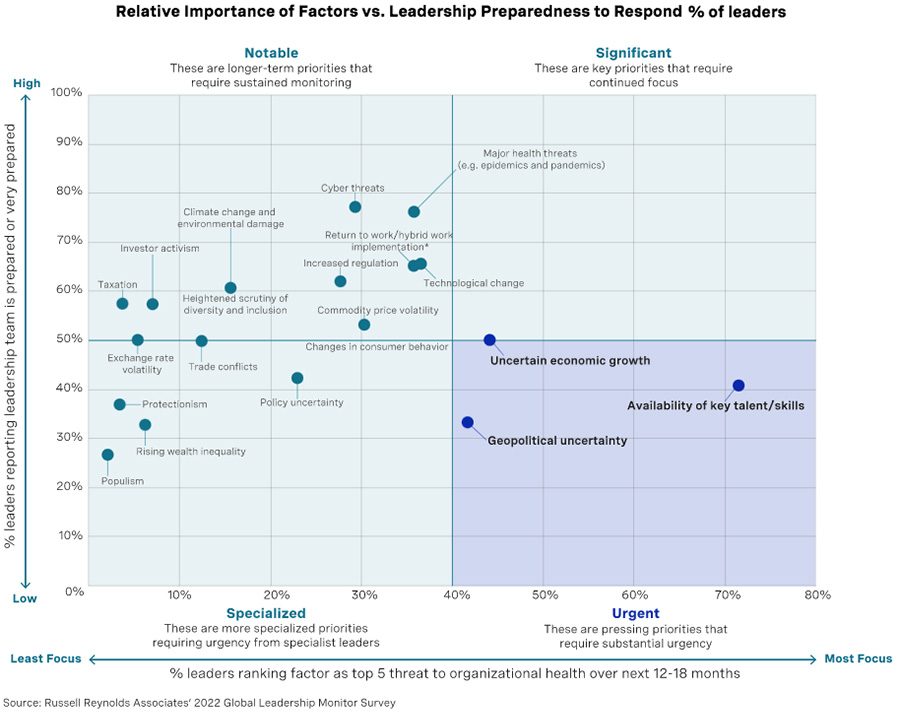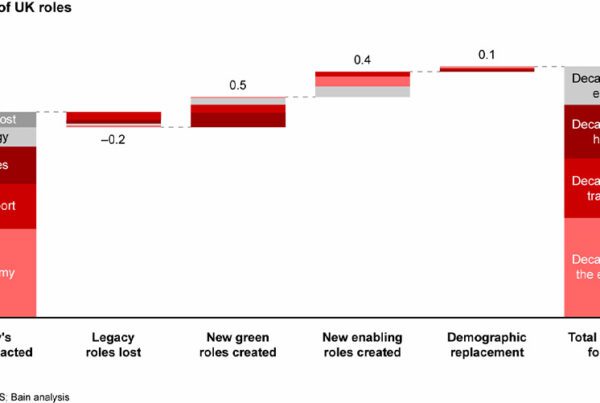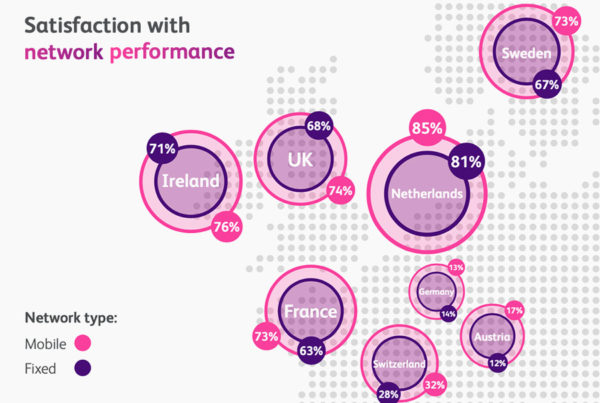2022 has brought a number of long-standing issues to a head – from geo-political tensions, to the mounting climate emergency – which have created a number of major challenges for businesses . A new report by Russell Reynolds Associates has identified the top threats executives have to deal with this year.
Every year, Russell Reynolds Associates administers The Global Leadership Monitor, an annual survey of executives and non-executive directors, which tracks key threats to organisational health and leadership preparedness to face them, as well as indicators of confidence in leadership, and leaders’ engagement and career aspirations. This year, 1,590 business leaders, who represent 46 countries in Africa, Asia, Americas, Europe, Middle East and Oceania, replied to the survey – including 195 from the UK.
They were all asked one simple question: what are the main threats to business over the next 12-18 months? Respondents identified three leading risks, which must be dealt with urgently.

Availability of key talent
The so-called ‘war for talent’ has been a firm fixture on the business agenda for the best part of a decade now. With employment rates steadily rising since the last recession in 2011, businesses across all sectors of the economy have found it increasingly hard to recruit, particularly when it comes to finding workers who are proficient in digital tasks.
And while the pandemic did see a fall in employment, as the number of firms falling into financial distress spiked, labour remains a seller’s market. With many staff having re-evaluated what they expect from employers, during a lockdown where they were repeatedly reminded that their tasks were ‘essential’, but their pay and conditions did not reflect this, the Great Resignation has seen vacancies staying open for record periods across multiple industries.
As a result, it is not a surprise to see over 70% of business leaders tell Russell Reynolds that they consider talent availability to be their top concern in the coming months. However, they seem determined to wait on economic forces to simply bring them the results they need – with only around 40% having actually prepared to tackle the talent crisis pro-actively. This is a risky strategy, as while some executives will hope that steep inflation and rising interest rates work as a ‘disciplinary’ mechanism on workers, by decreasing their spending power, there has been little sign of such an effect just yet – even as the unemployment rate rises.
Geopolitical Risk
Fewer executives see geopolitical risk as a key agenda item – at just over 40% of respondents putting it in their top five. But of those most commonly cited concerns, leaders are also the least prepared for an escalation in geopolitical tensions.
Many firms already struggled to adapt to the events unfolding in Ukraine, underestimating the importance of the eastern European country when it comes to supplying staple ingredients like sunflower oil and wheat – as well as the impact a freezing of relations between the West and Russia would have on the global energy supply. While governments and businesses have been talking about moving toward renewables for decades now, it has become clear that these efforts were still in their nascent stages at best – while the West is still firmly in the grips of a fossil-fuel addiction that Russia has wasted no time in exploiting. Looking ahead, however, the supply chain issues relating to that conflict could be dwarfed in the coming months.

China’s relations with the West could also sour quickly. With US Senator Nancy Pelosi having decidedly kicked the hornet’s nest earlier in 2022, by visiting the independent territory that China maintains a claim to, the situation has deteriorated rapidly, even as the US and EU look to strengthen ties with Taiwan. China is still a key outsourcer of manufacturing and production in the global supply chain, and should relations between it and the West go the way of Russia, that will have major repercussions on global trade – repercussions which 66% of leaders who said geopolitical uncertainty was a top threat are not prepared to face.
Economic Uncertainty
With daily forecasts of economic turmoil continuing, it was almost inevitable that executives would also have a coming recession weighing heavily on their minds. Just under 50% of leadership teams said that uncertain economic growth was a top threat. But again, there was not a majority who considered themselves ready to take on such a challenge. Around half of leadership teams who cited uncertain economic growth as a top threat are not prepared to face threat, while that fell beneath 50% among the wider pool of respondents.
In the UK, some experts contend that the economy is already in recession. The number of insolvencies is currently spiking, as HMRC attempts to reclaim debts from businesses that it delayed during the pandemic’s lockdown phase – while consumer demand has collapsed as the cost of living spikes and causes shoppers to shun ‘luxury’ purchases.
One way businesses might help insulate themselves from this perfect storm, is credit checking each of the companies they do business with – whether they have taken orders from a repeat customer or not. This could help understand customers’ creditworthiness, and avoid costly late payments, or debt recovery processes – which will increasingly become unaffordable for companies under financial strain themselves.
Other key threats
Of course, there are many other risks which will give business leaders headaches in the coming period. The leading challenge – as it has been for some time – among many firms is ‘technological change’, with companies having spent the last decade working to digitalise, for fear of losing business to competitors. This has left many relatively well-prepared, however, with just under 70% of leaders feeling ready for the challenge.
Meanwhile, major health threats understandably remain at the forefront of many leaders’ minds. Around 36% of respondents said further pandemics were high priorities for them. The number of Covid-19 is already creeping up again this autumn, while the prospect of new variants or even other contagions is a top concern for health authorities. Due to the last two years, however, three-quarters of leaders feel they are well-prepared for that eventuality.
Laura Sanderson, UK Country Manager at Russell Reynolds Associates, said, “Multiple systemic challenges have transformed the agenda of the board and executive leadership teams over the last five years. Today’s leaders need to combine financial and non-financial targets within a single strategy and tell a convincing story about the values of their business to a wide range of stakeholders.”




